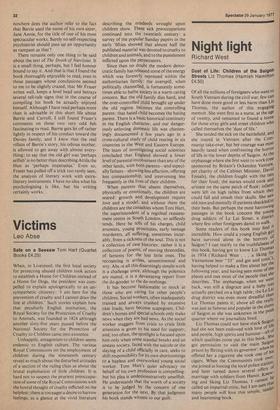Victims
Leo Abse
Safe on a Seesaw Tom Hart (Quartet Books £4.25)
When, in Liverpool, the first local society for protecting abused children took action to establish a Home for Children instead of a Home for Dogs, the president was compelled to explain apologetically to an unsympathetic citizenry: 'I am here for the prevention of cruelty and I cannot draw the line at children.' Such stories explain how that peculiarly English institution, the Royal Society for the Protection of Cruelty to Animals, was founded in 1824 although another sixty-five years passed before the National Society for the Protection of Cruelty to Children came into existence.
Unhappily, antagonism to children seems endemic to , English culture. The various Royal Commissions on the employment of children during the nineteenth century reveal as much about the disturbed attitudes of a section of the ruling class as about the brutal exploitation of little children. It is hard not to suspect the prurient preoccupation of some of the Royal Commissions with the horrid thought of cruelty inflicted on the helpless: there is too eager a desire to harrow feelings, as a glance at the vivid literature -describing the misdeeds wrought upon children show. These sick preoccupations continued into the twentieth century: a survey of the popular Sunday papers in the early 'fifties showed that almost half the published material was devoted to cruelty to children and animals, and to the punishment inflicted upon the perpetrators.
Since then no doubt the modern democratic family has released some of the energy which was formerly repressed within the authoritarian family: the overspill, when politically channelled, is fortunately sometimes able to bathe society in a warm caring concern. But the old family dies hard, and the over-controlled child brought up under the old regime becomes the controlling parent : that hated child becomes the hating parent. There is a basic historical continuity in the English character, and our dangerously unloving domestic life was chasteningly documented a few years ago in a cross-cultural study of child rearing in six countries in the West and Eastern Europe. The team of investigating social scientists concluded that England showed a lower level of parental involvement than any of the other lands, with both parents—and especially fathers—showing less affection, offering less companionshi P, and intervening less frequently in the lives of their children.
When parents thus absent themselves, physically or emotionally, the children are seared: growth and development require love and a Model, and without them the children are the casualties whom Tom Hart, the superintendent of a regional reassessment centre in South London, so selflessly tends. Here he tells of his charges, child arsonists, young prostitutes, early teenage murderers, all suffering, sometimes incurably, from a sickness of the soul. This is not a collection of case histories: rather it is a collection of poems, of moving threnodies, of laments for the lost little ones. The recounting is artless, unsentimental and wry. Abe ve all this disarmingly simple work is a challenge since, although the polemics are muted, it is a devastating report from the do-gooder to the do-nothings.
It has become fashionable to mock at those who are caring for other people's children. Social workers, often inadequately trained and always crushed by excessive case loads, have become scapegoats. Children's homes and special schools only make news when they are bad news. As the social worker staggers from crisis to crisis little attention is given to his need for support ; and, too often, the spotlight is focused upon him only when some scandal breaks and an uneasy society, faced with the suicide or the slaying of a child officially in care, seeks to shift responsibility for its own shortcomings to a hapless and overworked young social worker. Tom Hart's quiet advocacy on behalf of his own profession is compelling: but his plea is undemonstratively unselfish. He understands that the worth of a society is to be judged by the concern of one generation for the next. By that judgment his book stands witness to our guilt.










































 Previous page
Previous page